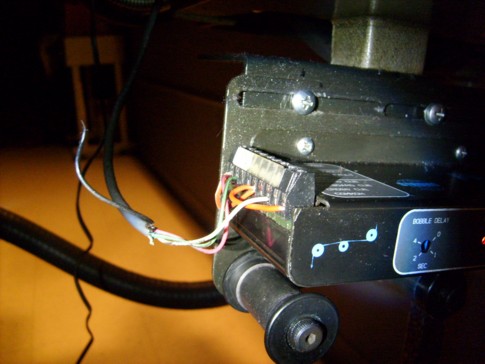|
|
This topic comprises 2 pages: 1 2
|
|
Author
|
Topic: (RESOLVED) FP-350 - wire breaks off
|
|
|
Ken Lackner
Phenomenal Film Handler

Posts: 1907
From: Atlanta, GA, USA
Registered: Sep 2001
|
 posted 01-29-2009 06:24 AM
posted 01-29-2009 06:24 AM




"Word up, homie!"
It's difficult to tell from the photo, but it looks like the stripped end of the wire that came off is exposed. If that's the case, the wire didn't so much as break off as it simply came loose from the terminal. I would check to make sure all the terminals are nice and tight. And if it did actually break off, simply strip back some more of the wire, stick it back in, and tighten down the screw. As for getting back on screen if this happens in the middle of a show, simply press Fault Defeat (I'm assuming here that you have a CNA automation) on the automation. This bypasses the failsafe circuit completely and allows you to continue to run in case of any problems with the failsafe. Just be careful, because the automation will not shut down if there is a brainwrap or other condition where it normally would.
| IP: Logged
|
|
|
|
|
|
|
|
|
|
|
|
|
|
|
|
|
|
|
|
|
|
Steve Guttag
We forgot the crackers Gromit!!!

Posts: 12814
From: Annapolis, MD
Registered: Dec 1999
|
 posted 01-30-2009 08:19 AM
posted 01-30-2009 08:19 AM




Generally speaking...soldering wires are a bad idea when the wires are to be flexed. the point where the wire transitions from the wicked solder to no solder becomes a point of failure and will break.
Likewise, crimping a solid wire is a very poor connection and the crimping process itself can often weaken wire if not have a failure from the get-go. You can cut solid wire with rather dull cutters, yet stranded wire does not cut so well or will be very ragged if cut with dull cutters...think of the crimp area as a dull cutter (very dull).
Now crimping stranded wire, then soldering has merit. The cimping will create a molecular bond between the terminal and the wire. The crimp will also immobilze the wire strands. By soldering after crimping, each form of connection augments the other. However, again, you don't want to let the solder wick up the wire past the crimp point.
As a certified reconer for speakers, I can tell you, one of the things that you get inspected on is when you make your tensil lead connections to the terminals on the basket. Solder is not to be allowed to wick up the lead to avoid the lead breaking...as such, one has to make these connections quickly to keep the heat localized.
For the wires to be breaking in Monte's case...I'd think that it is low strand count wire, and/or the wire was prepped poorly from the very beginning.
Steve
| IP: Logged
|
|
|
|
|
|
|
|
All times are Central (GMT -6:00)
|
This topic comprises 2 pages: 1 2
|
Powered by Infopop Corporation
UBB.classicTM
6.3.1.2
The Film-Tech Forums are designed for various members related to the cinema industry to express their opinions, viewpoints and testimonials on various products, services and events based upon speculation, personal knowledge and factual information through use, therefore all views represented here allow no liability upon the publishers of this web site and the owners of said views assume no liability for any ill will resulting from these postings. The posts made here are for educational as well as entertainment purposes and as such anyone viewing this portion of the website must accept these views as statements of the author of that opinion
and agrees to release the authors from any and all liability.
|

 Home
Home
 Products
Products
 Store
Store
 Forum
Forum
 Warehouse
Warehouse
 Contact Us
Contact Us




 Printer-friendly view of this topic
Printer-friendly view of this topic
















![[Big Grin]](biggrin.gif) . Solder pots are very handy for tinning enamled wire... it also removes the enamel cleanly.
. Solder pots are very handy for tinning enamled wire... it also removes the enamel cleanly.


